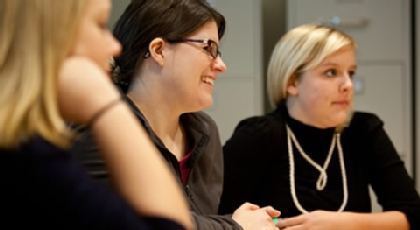Page 14 • (757 results in 0.016 seconds)
-
: Iberian Cultural Studies (4) HISP 322: Latin American Cultural Studies (4) HISP 325: Introduction to Hispanic Literary Studies (4) Advanced Literary, Linguistic, and Cultural Studies 8-16 semester hours, selected from the following: LTST 341: Latino/a/x Experiences in the U.S. (4) LTST 342: U.S. Latino/a/x Literary and Cultural Studies (4) HISP 401: Introduction to Hispanic Linguistics (4) OR HISP 403: Advanced Spanish (Study Away) (4) HISP 423: Special Topics in Iberian Literatures & Cultures (4
-
What types of support are the colleagues expected to offer?Colleagues offering support draw from their own experiences to point out available resources, empathize, offer strategies for coping and thriving, and (if they choose) share insights from their own journey. Colleagues offering support are not experts in counseling and no training is required before participating in this role. Some example topics that participants may wish to meet to discuss include, but are not limited to the following
-

Interpretation” is a new podcast devoted to exploring the meanings and implications of words commonly used in the news, on social media and on college campuses. Previous OTI topics include “Climate,” “Violence” and “Advocacy.” Upcoming topics include “Gender” and “Interpret.” Episodes of OTI are released once per month. If you have feedback, comments or ideas for episodes, please email producer Zach Powers at powerszs@plu.edu.Previous Episodes ``Violence``Guests: Professor of Psychology Michelle Ceynar and
-
disrespect for the person talking. It can even be interpreted as a lack of interest in what is being said. What can I talk about? One might expect that, in an environment where directness is valued in communication, all topics are appropriate for conversation. That is not really true. Some topics that are generally discussed with acquaintances or those one does not know well: The weather One’s commuting experience and cars Classes and jobs Sports Music, movies Fashion, shopping, and clothes Topics not to
-
mathematics, conduct evening help sessions, grade mathematics homework assignments, and coach/tutor public school students in the Mathlete Coaching Program.How do I Become a Statistician?To become a statistician, you must first develop a strong background in the field of mathematics. Once you have a thorough grounding in topics such as calculus and linear algebra, you may begin courses in probability theory, statistical analysis, regression analysis, and even combinatorics. These classes will vary between
-

. “This gives me an opportunity to discuss topics that otherwise, I may not know about,” said Briggs, who added that many contestants brush up on issues covered in The Economist before appearing at “worlds” as the contest is commonly referred to among the debating crowd. Often, judges pull topics covered in the UK-based publication for the contest. Debate gives one an understanding of the importance of what you say, as well as how you say it, said Skinner, a communications major from Covington, Wash
-
are only two types of people, racists and antiracists. In other words, there is no middle ground, either you are working actively against racism or you are part of the problem. In this department, we are committed to reflecting on ways that we can fight against racism in all of its insidious forms and we hope that you will take time to do the same. In that effort, this is a short list of some resources we think might be helpful in exploring topics of race and policing in America: Books: Ibram X
-
in a disciplinary context or provides deeper study of data science topics. The course must go beyond introductory topics and techniques to develop advanced statistical expertise for the respective field where at least one of the following are met: Data are not easily collected (e.g., makes use of intricate study design; requires in-depth survey design), OR Data are not easily managed (e.g., data are messy; data set is excessively large; data are not easily synthesized), OR Data are not easily
-
supporting courses from a Domain-Specific Elective. Select at least one option from the list of Domain-Specific Electives that applies data science principles in a disciplinary context or provides deeper study of data science topics. (See details below.) * MATH/STAT 145, STAT 231, STAT 232, or STAT 233 may replace MATH/STAT 242. **ECON 344 may substitute MATH/STAT 442 if it is not also used as the domain-specific elective. All courses counted toward the major must be completed with grades of C or higher
-

the mechanical, physiological, and psychological components of movement. The study of kinesiology involves deep understanding of various biological systems as well as behavioral theories. Many people are introduced to the concept of kinesiology through a sub-field like physical therapy or sports medicine, but kinesiology is the larger umbrella term for the theory and practice of human movement. Let’s talk specifically about options for jobs with a master’s in kinesiology and what responsibilities
Do you have any feedback for us? If so, feel free to use our Feedback Form.


